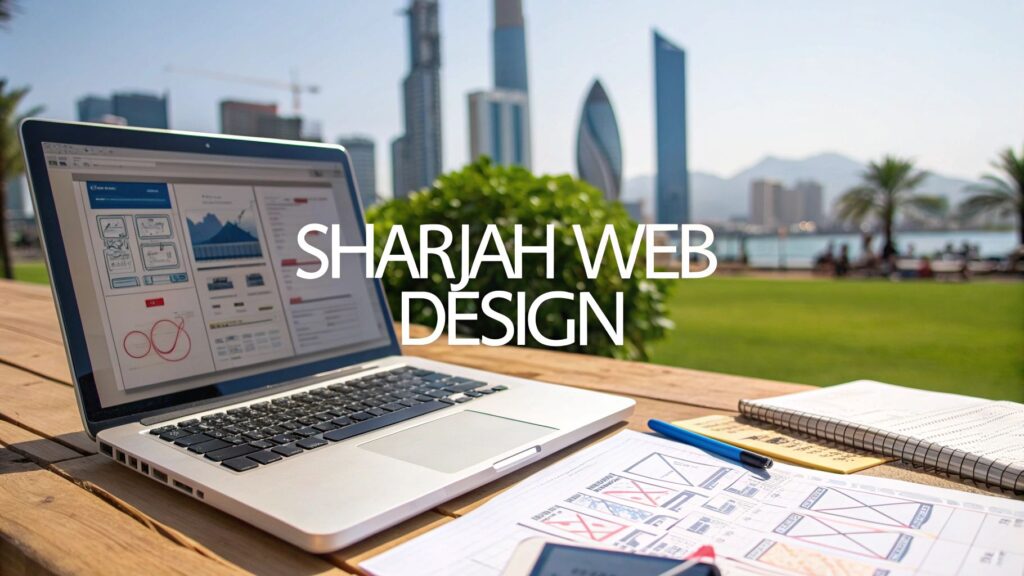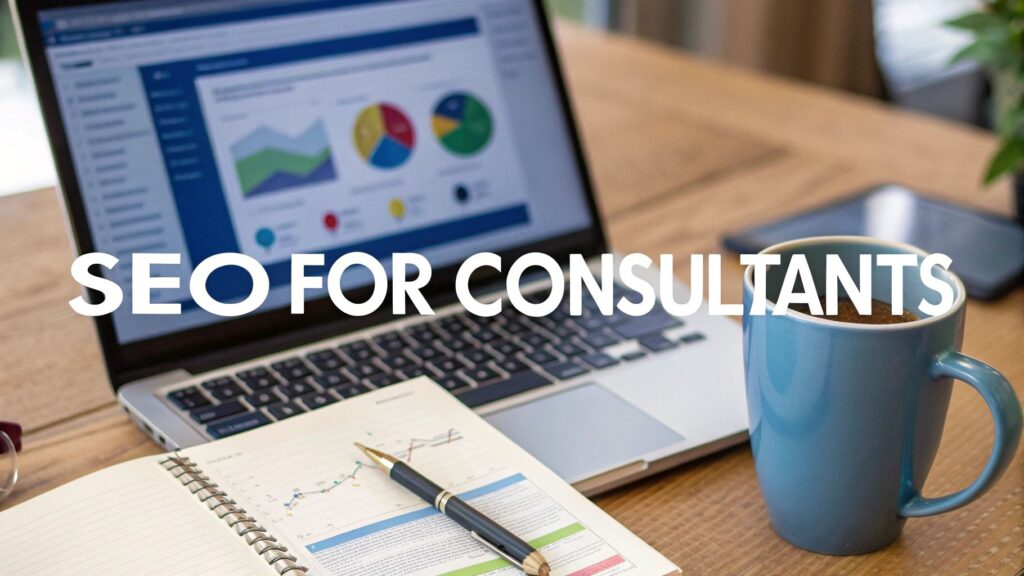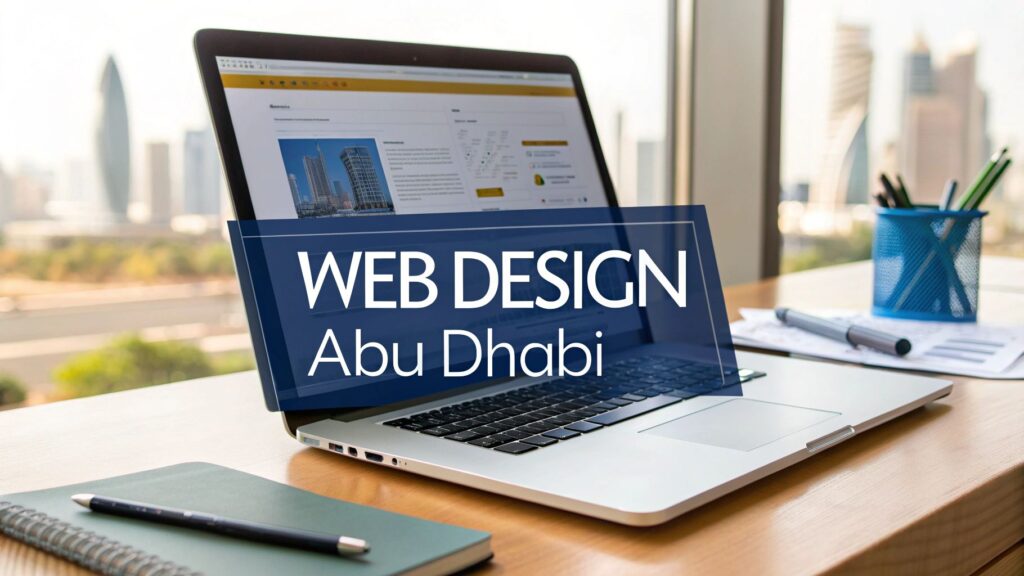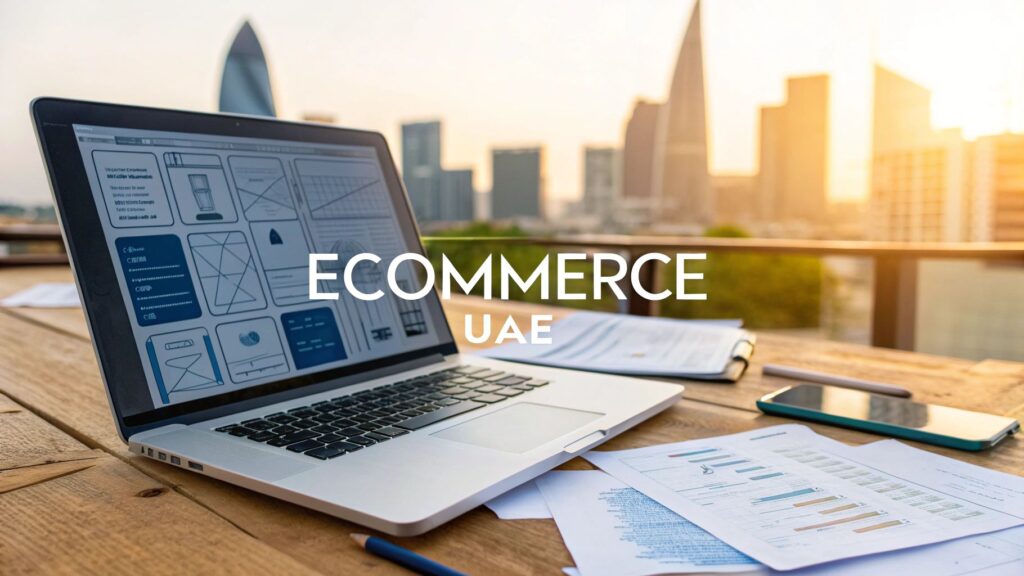Picking a web designing company in Sharjah is one of the most important decisions you’ll make for your business. It’s not just about aesthetics; it’s about finding a team that genuinely gets the local market and can turn your vision into a website that actually works for you.
Finding the Right Web Partner in Sharjah
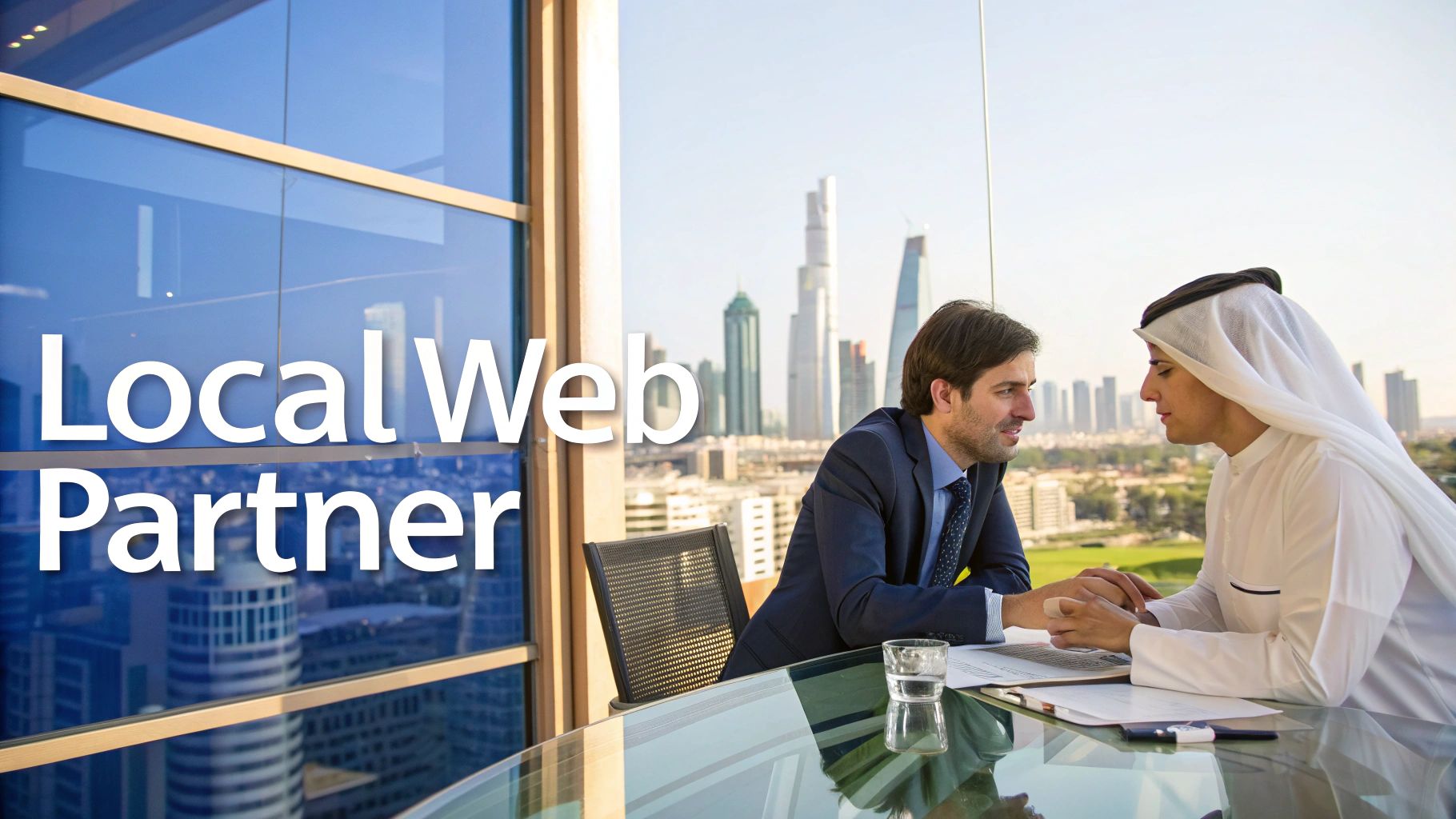
Sharjah’s business scene is a unique blend of heritage and forward-thinking enterprise. A successful website here needs to strike that same balance. As you start looking around, you’ll find everyone from small, specialised studios to big agencies that do it all.
The right choice will make or break how well you connect with customers here. A local agency doesn’t just bring coding skills; they bring crucial market knowledge. They understand what makes a Sharjah-based customer tick, which informs everything from the design to the words on the page.
Why Local Expertise Matters
Working with a company that has deep roots in the local market gives you a serious leg up. Their experience means they build sites that not only look great but feel right to the local audience and work smoothly for them.
Here’s what you should be thinking about:
- Arabic Language Proficiency: A truly local site isn’t just translated. It needs a team that can expertly handle right-to-left (RTL) layouts and write persuasive Arabic content that connects with your audience. It’s a specialist skill.
- Regional E-commerce Trends: People in Sharjah shop online in specific ways. A local firm knows which payment gateways are popular and trusted, and how to create a checkout flow that reduces abandoned carts in this specific market.
- Local SEO Knowledge: Getting found on Google in Sharjah requires a tailored approach. A good local partner knows the exact Arabic and English keywords your customers are using and how to get your site ranking for them.
The best web designing company in Sharjah for you will be more than just a vendor; they’ll be a partner. They should be just as invested in your success as you are, offering ideas that help you win over your ideal customers.
In the end, this is about building a solid digital foundation for your business’s future. To see what a professional team can truly bring to the table, it’s worth exploring comprehensive web design and development services to understand the full potential for your brand.
Defining What Your Business Website Needs
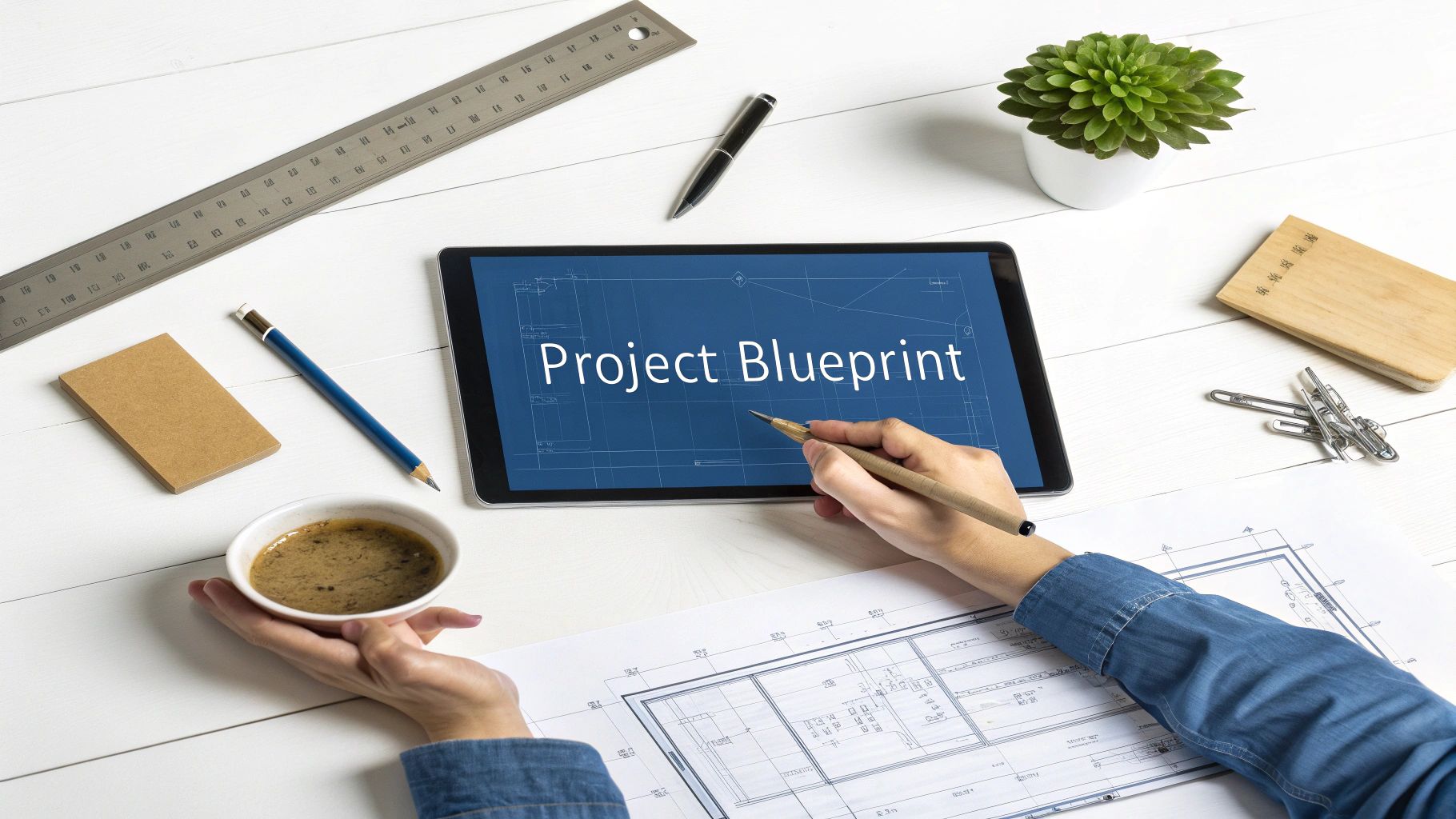
Before you even think about talking to a web designing company in Sharjah, you need a solid blueprint of what you actually want to build. Going beyond vague ideas like “I need a modern website” is the crucial first step.
Getting this clarity from the start is what separates a successful project from a frustrating one. It helps you get accurate proposals and, more importantly, find a partner who genuinely gets what you’re trying to achieve. It also stops that dreaded “scope creep” in its tracks.
So, what’s the core purpose of your website? Is it a machine for generating sales leads? An e-commerce platform for selling products across the UAE? Or maybe a content hub to position your brand as the go-to expert in your field? Each of these goals demands a completely different design, set of features, and user experience.
From Vague Ideas to Concrete Goals
Saying you want to “increase sales” is a great starting point, but it’s not enough for a web designer to work with. You need to translate that into tangible, measurable goals that a website can directly impact. This is how you turn a simple online brochure into a real business asset that works for you 24/7.
Think about specific, goal-driven requirements like these:
- E-commerce Functionality: Will you need secure payment gateways that handle credit cards and digital wallets popular in the UAE? What about features like multi-currency pricing, live inventory tracking, or customer accounts for repeat buyers?
- Lead Generation Engine: Is your target to capture 500 new qualified leads per month? That tells an agency they need to build in prominent contact forms, clear calls-to-action (CTAs) on every page, and maybe even a live chat function.
- Custom Systems: Does your business run on appointments? A custom booking system that syncs directly with your team’s calendars might be a non-negotiable feature.
A detailed project brief is your most powerful tool. It not only forces you to think through every detail but also empowers agencies to provide realistic timelines and precise, itemised quotes. A lack of clarity at this stage is the number one cause of budget overruns later.
Outlining Your Project Scope
With your goals in mind, start creating a document that lists every single functional requirement. Think about who will be using the website—not just your customers, but your internal team as well.
For instance, if your marketing team will be publishing blog posts and updating landing pages, a user-friendly Content Management System (CMS) like WordPress is probably essential.
Your brief also needs to clearly define your target audience. Are you selling to other businesses (B2B) in Sharjah’s industrial zones, or are you marketing directly to consumers (B2C) across the Emirates? This distinction completely changes the design, the language you use, and the entire user journey. Doing this foundational work is a key part of the comprehensive website development services any top-tier agency offers, ensuring the final product is built for success from day one.
How to Look at a Web Design Portfolio The Right Way
An agency’s portfolio is their resume. It’s the proof in the pudding. But it’s easy to get wowed by some flashy graphics and slick animations. You need to dig deeper to see if a web designing company in Sharjah can actually build something that helps your business grow.
Remember, you’re not just buying a pretty picture. You’re investing in a tool that needs to work hard for you. So, the question isn’t just “Does it look good?” but “Does it work?” A stunning website that nobody can figure out how to use is a beautiful failure. What you’re really looking for is evidence that they think strategically.
Start by looking at the range of their work. Have they only worked with clients in one industry, or do they have a diverse collection of projects? A portfolio that shows they can adapt to different brands and business models is a great sign. It proves they’re flexible and have a wider range of skills.
Going Deeper Than a Screenshot
Don’t just scroll through the images on their portfolio page. That’s the highlight reel. You need to get your hands dirty and click through to the actual live websites they’ve built. This is the only way you’ll get a real feel for the user experience and performance.
Once you’re on a live site, play around like you’re a real customer. Ask yourself these questions:
- Is it easy to get around? How many clicks does it take to find the contact page or their list of services? If you get lost, so will your customers. A confusing menu is a deal-breaker.
- How does it look on your phone? Pull it up on your smartphone right away. Does everything resize and rearrange nicely? A huge chunk of your traffic will come from mobile, so this isn’t optional.
- Is it fast? Pay attention to how quickly pages load. Even a few seconds of delay can send potential customers packing. Slow sites are bad for business and bad for Google rankings.
- What do they want you to do? Look for clear buttons and prompts like “Get a Quote” or “Shop Now.” A good website guides users and tells them what to do next.
This kind of hands-on testing will tell you far more than a static gallery ever could. For a solid example of how a portfolio should be presented, feel free to browse through the Invocom project portfolio.
This simple decision tree helps break down the main things to look for: Industry Relevance, Technical Skill, and User Experience.
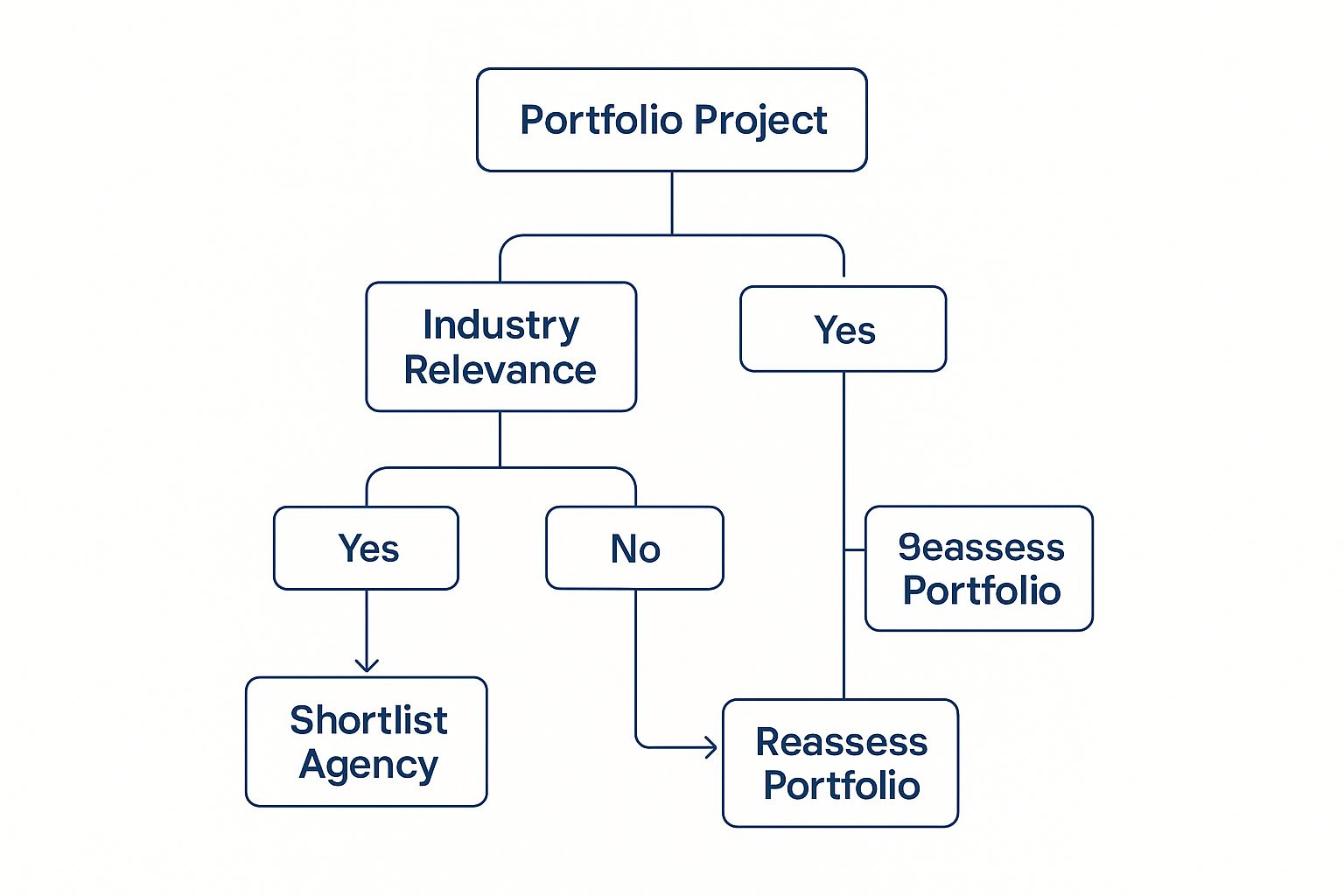
Think of it this way: if a project in their portfolio falls short on any of these points, it’s a warning sign. You need to stop and reconsider if they’re the right fit for you.
Reading Between the Lines of Their Success Stories
Case studies and client testimonials are great, but you need to be a bit of a detective. Vague praise like “they were a pleasure to work with” is nice, but it doesn’t tell you much.
Look for specifics. A testimonial that says, “our online enquiries shot up by 40% in the first three months” is pure gold. That’s a measurable result.
The Sharjah web design scene is moving fast. There’s a big push for human-centred design that’s accessible and works perfectly on mobile. By 2025, it’s expected that around 60% of web projects will need to be highly scalable, especially for key local industries like e-commerce and real estate. And when you look at client reviews, 80% point to professionalism, creativity, and hitting deadlines as the most important factors for success.
Here’s a pro tip: Pay close attention to the problems the agency solved. A truly great portfolio isn’t just a gallery of finished websites. It tells the story of a business challenge and how smart design and clever development solved it. That’s the sign of a partner, not just a supplier.
Diving Deeper: The Questions That Really Matter

Alright, you’ve got your shortlist of promising agencies. Now it’s time for the consultations. This is your moment to get a real feel for the people and the processes behind all those pretty portfolio pieces. Asking the right questions at this stage is what separates a smooth project from a future filled with headaches and surprise invoices.
Think of these meetings as a two-way street. You’re not just hiring a supplier; you’re looking for a long-term partner. A great web designing company in Sharjah will be just as interested in your business goals as you are in their skills.
It’s easy to get fixated on the price tag, but that rarely tells the whole story. A rock-bottom quote can sometimes mask a cookie-cutter process, a junior-level team, or non-existent support once your site is live. Let’s peel back the layers and find out how these agencies truly operate.
How Do They Actually Work?
Every agency has its own rhythm. You need to make sure their workflow clicks with your own expectations for communication and collaboration. A mismatch here is a recipe for frustration.
Don’t be shy—ask them to walk you through their process. A simple “Can you take me through your typical project, from our first chat to launch day?” will tell you a lot about how organised they are. Find out what tools they use to keep things on track. Do they use platforms like Trello or Asana, or do they have a custom client portal? This gives you a clear idea of how you’ll be able to monitor progress.
Here are a few essential questions to get that conversation rolling:
- How do you prefer to communicate? Are we talking scheduled weekly calls, or is it all done through email?
- How many rounds of design revisions are actually included in the price you quoted?
- Who will be my day-to-day contact? And more importantly, who is the person actually building my website?
Nailing Down the Technical Nitty-Gritty
This is where many business owners get tripped up—the technical details that seem small now but can become massive problems later. Don’t be afraid to dig in; these questions are crucial for the long-term health and security of your website.
Ownership is non-negotiable. You need to ask, point-blank: “Once the final invoice is paid, who owns the website code, the design files, and all the content?” The only acceptable answer is you. Any agency that wants to retain ownership is a huge red flag. This applies to your domain name and hosting account, too—make sure they’re registered under your business name.
A good, transparent agency will give you clear, confident answers about ownership and ongoing support. If you get vague replies or hesitation, it might be a sign of fuzzy terms or a lack of planning for what happens after launch.
Be sure to also cover performance and security:
- SEO: How do you build SEO best practices into the website from the very beginning?
- Support: What happens after the site goes live? What’s included in your maintenance plan, and will you train my team on how to manage the content?
- Hosting: Do you handle web hosting, or is that on me? What hosting solution do you recommend for a business like mine in Sharjah?
Once you’ve had these conversations, it’s helpful to lay everything out side-by-side.
Web Design Agency Vetting Checklist
Use this quick checklist to compare your top contenders. It helps you move beyond a gut feeling and make a decision based on concrete information.
| Criteria | Agency A | Agency B | Agency C |
|---|---|---|---|
| Portfolio Quality & Relevance | |||
| Understanding of My Business | |||
| Communication Style | |||
| Clear Project Timeline | |||
| Revision Rounds Included | |||
| SEO Approach | |||
| Post-Launch Support Plan | |||
| Full Ownership Confirmed | |||
| Cost & Value |
This simple table can instantly highlight which agency is the strongest all-around partner for your specific needs, making your final choice much clearer.
Making Sense of Proposals and Pricing
After the initial chats, the proposals will start landing in your inbox. This is the moment things get serious. Sifting through these documents is where you’ll really separate the pros from the pretenders and decide on your web designing company in Sharjah.
If you get a vague, one-page quote, consider it a major red flag. What you’re looking for is a detailed breakdown that shows they’ve actually listened to you. A good proposal isn’t just a sales document; it’s the blueprint for your project, reflecting a genuine understanding of your goals and how to get there. It should feel like the first chapter of your new website’s story, not just a price tag.
Decoding the Proposal Document
A professional proposal from a reputable agency will be well-organised and easy to follow. Fight the urge to just skip to the price at the end. You need to read every line to make sure there’s no room for misunderstandings down the road.
Here’s what a solid proposal should always include:
- A Detailed Scope of Work: This is the core of the document. It needs to list every single deliverable, from the first wireframe and design mock-up all the way to the final, tested website going live. If something you talked about isn’t written down here, you have to assume it’s not part of the deal.
- Project Milestones and Timelines: A clear schedule with key dates is crucial. It shows the agency has a structured plan and gives you a realistic idea of when to expect progress.
- The Payment Schedule: Most agencies will ask for a deposit to kick things off—usually 30-50%—with the remaining payments linked to hitting specific milestones. Make sure this is laid out crystal clear.
- Intellectual Property Rights: This part is non-negotiable. The contract must state, without any ambiguity, that you own 100% of the website code and design files once the final payment is made.
A well-crafted proposal is a form of protection for both parties. Be wary of fuzzy terms like “unlimited revisions.” While it sounds great, it often leads to scope creep and frustrating delays. A defined number of revision rounds included in the price is a much better sign of a professional process.
Understanding Common Pricing Models
The web design market in Sharjah is competitive, which is good news for you. As of 2025, the emirate is home to over 600 web design and development agencies.
Knowing how agencies structure their fees will help you figure out what makes the most sense for your project and budget.
- Fixed-Price Contract: This is the most common approach you’ll see. You and the agency agree on one set price for the entire project based on the scope you’ve defined. It’s perfect for projects where you know exactly what you need because it gives you complete budget predictability.
- Hourly Retainer: This model works best for ongoing maintenance, support, or projects that are expected to change and grow over time. You essentially book a block of the agency’s time each month. It offers great flexibility, but you’ll need to keep a close eye on the hours to prevent costs from getting out of hand.
For most businesses building a new website from scratch, a fixed-price contract provides the most security. It ensures you get exactly what you signed up for without any nasty surprises on the final invoice.
Your Top Questions About Hiring a Web Designer, Answered
Even with all your research done, it’s completely normal to have a few final questions buzzing around before you sign on the dotted line. A new website is a serious investment, and you want to feel confident you’re making the right call. We get it.
Let’s walk through some of the most common questions business owners in Sharjah ask when they’re about to partner with a web design company. Getting these things clear from the get-go is the best way to avoid headaches down the road.
What’s a Realistic Timeline for Building a New Website?
This is probably the most-asked question, and the only honest answer is: it really depends. There’s no one-size-fits-all schedule. A straightforward, clean website with a few pages might be ready in four to six weeks. But if you’re looking at a large e-commerce site with all the bells and whistles, you could be looking at three months or more.
Any professional agency worth its salt will provide a detailed project roadmap. This isn’t just a launch date; it’s a full timeline with clear milestones for every stage—from the initial design mock-ups and content gathering to the technical build, testing, and the big launch day.
Be very cautious of any company promising a lightning-fast turnaround before they’ve even had a deep conversation about what you actually need.
How Much of My Time and Involvement Will This Take?
Your input is absolutely essential, especially at the start. You’re the expert on your business, your customers, and what makes your brand tick. The design team will count on you for a few key things:
- The Discovery Phase: This is where you’ll share your vision, business goals, and who your ideal customers are.
- Providing Content: You’ll need to supply the text, photos, and your company logo that will bring the site to life.
- Giving Feedback: You’ll be asked to review designs and check on progress at specific points.
A great agency will make this feel easy and organised. They’ll tell you exactly what they need and when, keeping the project moving forward. They lead the process, but your insights are the fuel.
Don’t underestimate how much your feedback matters. Clear, timely communication from you is one of the biggest factors in keeping a project on track and making sure the final website is something you’re genuinely proud of.
What Happens After My Website Goes Live?
Think of your website launch as the starting line, not the finish line. To keep your new site running smoothly, securely, and quickly, you need ongoing support. Most reputable agencies offer some kind of maintenance plan, which usually covers:
- Regular software and plugin updates
- Security monitoring and scans
- Performance checks to keep things fast
- Reliable backups of your content
Make sure you ask what their post-launch support looks like. Is it a monthly plan, or do they charge by the hour? Knowing this upfront ensures your new digital asset stays in great shape long after launch day.
This expectation for professional aftercare is a sign of how much the local industry has grown. In fact, web design companies in Sharjah are a huge part of the UAE’s software development scene, which is now the 6th most popular market segment in the country. The number of web design firms has quadrupled since 2015 because of the high demand. More choice is great for you, but it also makes it even more important to find a partner who will be there for the long haul.
At Invocom, we focus on building lasting partnerships, not just websites. We give you straight answers and a clear process from day one, making sure your new website becomes a genuine tool for your business’s growth. Let’s build your digital future together.

